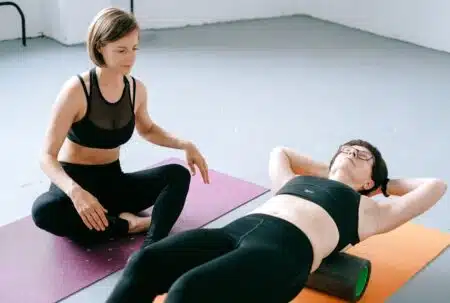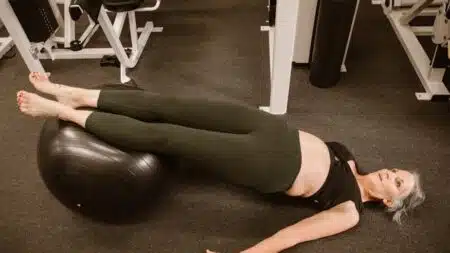Abdominal bloating is a common complaint that can cause significant discomfort and distress. Characterized by a swollen, tight abdomen and sensations of fullness and pressure, bloating affects up to 30% of adults on a regular basis. While occasional bloating after a large meal is normal, frequent or severe bloating may indicate an underlying gastrointestinal issue.
Fortunately, there are steps you can take to find relief. In this blog post, we’ll explore how physical therapy can help tackle the root causes of abdominal bloating. With hands-on treatment and at-home exercises, a physical therapist can work with you to relieve discomfort and improve digestive health.
Table of Contents
ToggleCauses of Abdominal Bloating
Before diving into treatment, it’s important to understand what causes bloating in the first place. There are several contributing factors, including:
- Food sensitivities – Some foods like dairy, wheat, and high-FODMAP foods can trigger bloating and other digestive issues in sensitive people. Overeating and eating too quickly can also cause problems.
- Gastrointestinal disorders – Conditions like irritable bowel syndrome (IBS), small intestinal bacterial overgrowth (SIBO), and gastroparesis often involve bloating.
- Constipation – Infrequent, difficult bowel movements allow stool to build up, putting pressure on the abdomen.
- Weak core and pelvic muscles – Impaired muscles can’t properly support abdominal organs, leading to sagging, compression, and bloating.
- Stress and anxiety – The gut-brain connection means mental health issues can manifest physically as digestive troubles.
As you can see, abdominal bloating can stem from diet, underlying conditions, bowel movement problems, muscular dysfunction, and even state of mind. Thankfully, physical therapists are uniquely equipped to address many of these areas.
Treating Bloating with Physical Therapy
Physical therapists employ a wide range of hands-on techniques and exercise interventions tailored to each patient’s specific needs. Common physical therapy treatments for bloating include:
Manual Therapy for the Digestive System
Skilled physical therapists can use visceral manipulation or myofascial release to gently mobilize and decompress the abdominal organs and muscles, relieve adhesions or scar tissue, improve blood flow, and encourage normal motility through the digestive tract. These hands-on techniques provide both immediate and lasting relief from tension, spasms, and trapped gas that contribute to bloating.
Core, Pelvic Floor, and Postural Exercises
Once proper alignment and mobility of the digestive system is restored, specific exercises help to strengthen the abdominal and pelvic floor muscles. Just like any other muscles in the body, these important core muscles can become weak, strained, or overly tense. Physical therapists create customized exercise regimens to address deficiencies unique to each patient. Improving control and coordination of these muscles gently “massages” the internal organs and encourages healthy bowel function.
Dietary Guidance
Bloating is often aggravated by eating habits that physical therapists can help to identify and correct. Your PT may recommend eliminating trigger foods, adding gut-soothing nutrients to your diet, spacing meals appropriately, slowing down while eating, practicing mindful eating habits, and staying hydrated. Dietary changes complement physical therapy interventions.
Stress Reduction
Given the strong connections between the mind and digestive system, physical therapists often provide training in healthy stress management. From diaphragmatic breathing to progressive muscle relaxation to mindfulness meditation, many patients find stress-reducing exercises helpful for settling the nervous system, quieting the mind, and allowing the body to return to homeostasis. These tools help you tap into the body’s natural relaxation response to promote better digestion and less bloating.
Pelvic Floor Dysfunction and Constipation Treatment
For some patients, abdominal bloating is accompanied by issues like pelvic floor dysfunction and constipation. Pelvic floor PTs specialize in relaxing and coordinating the pelvic floor muscles to allow complete bowel emptying without straining. Recommendations for proper toilet posture, abdominal massage, and other at-home techniques can help maintain regularity.
The physical therapist’s whole-body approach addresses every aspect of health to provide customized bloating relief. Hands-on manual therapy, personalized exercise routines, dietary guidance, stress reduction techniques, and pelvic floor/constipation treatment give you all the tools needed to gain freedom from discomfort.
Seeing Results with Physical Therapy
One of the main benefits of seeking physical therapy treatment for abdominal bloating is experiencing tangible relief and results. The blended approach of manual therapy, postural correction, core strengthening, and stress reduction allows you to start feeling better after just a few sessions.
Additionally, your physical therapist will teach you exercises, stretches, and lifestyle habits to practice at home between appointments. These activities reinforce proper alignment, build core strength, and encourage healthy digestion and bowel function. By actively participating in your treatment plan, you greatly improve and extend treatment outcomes.
The goal is for these changes to become automatic habits that prevent future bloating flare-ups. With consistent home practice of the personalized tips and techniques provided by your knowledgeable PT, you can achieve long-lasting digestive wellness and a flatter belly!
Take Control of Abdominal Bloating
If abnormal bloating is interfering with your quality of life, know that you don’t have to simply tolerate the discomfort. There are trained professionals ready to help! Seeking skilled physical therapy can be truly life-changing for people plagued by chronic digestive issues.
A whole-body approach ensures your unique situation is fully assessed and addressed through hands-on manual therapy, postural correction, custom exercises, dietary guidance, and stress management. Physical therapists empower each patient with the tools to prevent future discomfort.
Stop letting bloating hold you back from feeling your best. Take control of your health by scheduling a physical therapy evaluation today! With persistence and participation, you can get back to enjoying each day comfortably again.



